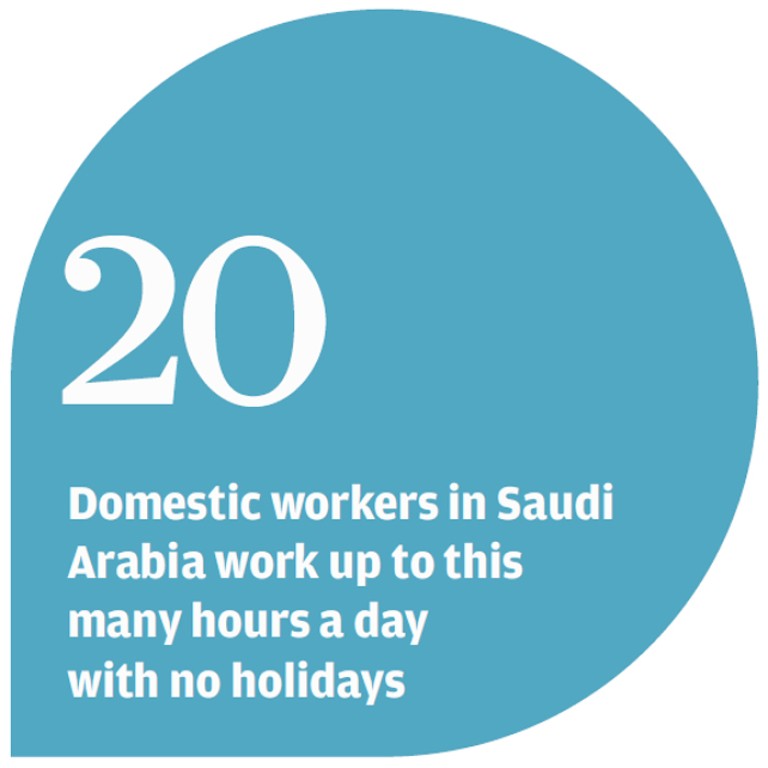
Frightening fate awaits women fleeing poverty
Pair rescued after four months locked in Delhi flat are victims of a new wave of recruitment scam offering well-paid jobs in the Middle East
The two women sit in a grimy flat in west New Delhi. The sound of traffic filters through the curtained windows. It is dark and they are talking about their rescue a few hours before and how they might get back to their homes 1,600 kilometres away.

Denied any outside contact, they were freed only when police, acting on a tip-off, raided the "human warehouse" where the women were being kept.
The pair are victims of a new wave of abuse as more women from India are recruited by agents for jobs in the Middle East.
There were 3,517 incidents relating to human trafficking in India in 2011, the National Crime Records Bureau says, compared to 3,422 in 2010. Most involve women, often from very poor backgrounds, being seized forcibly or misled into lives of harsh domestic labour or sex work within India.
But increasingly police and campaigners are uncovering illegal operations that channel women to countries such as Saudi Arabia, Bahrain or the United Arab Emirates.
Many work without problems, sending much-needed cash back to their families. But others fall prey to unscrupulous and often violent intermediaries.
Anis Begum, 27, an almost destitute mother-of-four from Hyderabad, said she had paid 10,000 rupees (HK$1,450) to an agent to go to Saudi Arabia after being promised well-paid work as a maid. Instead, she was locked in a storeroom and then sold as a sex worker for the equivalent of about HK$3,500, beaten, imprisoned and abused.
"I was scared I might get pregnant. If I did, I thought they might kill me," she said. She was freed by her captor's wife after months of confinement in their home in Riyadh, the Saudi capital.
Such stories are increasingly familiar to police. In a police operation last April, a trafficking ring in Bangalore that had sent more than 200 women to the Gulf was broken up. The gang received about HK$30,000 for every woman they delivered to brothels in Muscat and Dubai.
Most of the women recruited by the agents come from severely deprived backgrounds and are often illiterate. Unable to verify inflated or misleading claims, they travel willingly.
Those freed in the Delhi operation were told they would be dancers. Anis Begum was told she could earn about HK$1,500 a month, four times her wage as a hospital cleaner.
The two women released from the Delhi flat-cum-prison were typical of many victims. No one had forced them to leave their homes and Malti, from northern West Bengal, had already spent two years in Saudi Arabia, where she was neither abused nor denied pay, as a domestic servant. She was trying to return to the Gulf for more work when she got involved with the agent who imprisoned her.
Sita, an illiterate mother of five whose husband earns around HK$18 a day as a labourer, had little idea where she was going or what awaited her when she left her village last summer. "I was told I was going to earn a good salary by a woman who came to my home. I need to feed my children so I went with her. She brought me to Delhi in a train but then I was locked up," Sita said.
Malti said that up to 50 girls spent time in the flat while she and Sita were there. Some would be sent off, presumably to work in the Middle East. "But most of us stayed put. No one had any money or contacts. We were helpless," she said. One reason for the women's imprisonment could have been a problem with paperwork, perhaps an official who had not been paid off.
As their imprisonment entered a fifth month, Malti managed to contact a distant acquaintance through a sympathetic intermediary. Eventually word reached an activist, who informed the police.
"I'll be more careful in future" said Sita. "I'd still try again though. I need the work to feed my family."
